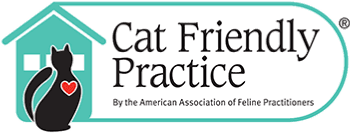Posts in Category: Dog & Cat Care
Life’s an itch! Is an itch just an itch, or is it an allergy?
“Max”, the schnauzer next door begins to wheeze, scratch and chew at himself at the first sign of Spring. “Kitty”, the sweet tabby across the street gets an upset tummy whenever she eats a particular food. And “Ginger”, your very own lovable mutt, scratches herself raw anytime she’s bitten by even one flea. She even keeps you up at night with the constant scratching and collar jingling!
There are countless diseases that can cause pets to scratch including mange, fungal infections, ringworm, some bacteria, and even shampoo residue left on the pet’s skin after bathing. But the poor, uncomfortable pets mentioned above suffer from an affliction called allergies.
poor, uncomfortable pets mentioned above suffer from an affliction called allergies.
An allergy is the body’s reaction to a substance it can’t tolerate well. When the body comes in contact with an allergen (allergy-causing substance), either through physical contact, through something eaten, or by inhaling the substance, it produces antibodies and is called an allergic reaction. Common contact allergens include house dust, pollen, feathers, flea saliva, wandering Jew plants, ragweed, staph bacteria, and grass.
In pets, the allergic reaction can cause various symptoms including vomiting, diarrhea, and other gastrointestinal problem; respiratory problems; a runny nose and runny eyes; or itchy skin. Allergic pets will often lick their paws, scratch or rub their faces, or have watery eyes. Repeatedly red, or infected ears can also be a result of an allergic reaction. The constant scratching can produce bacterial skin infections and hair loss.
Flea allergy is the most common allergic reaction. Signs include intense itching, red skin, and the appearance of small, hard, red bumps called papules. The most common sites are the base of the tail (a common area for fleas), along the spine, and on the pet’s inner thighs and abdomen.
In halant allergy (called atopy) is the second most common allergic skin disease, mostly in dogs. At first, the condition is seasonal, but may become almost constant as the dog ages.
halant allergy (called atopy) is the second most common allergic skin disease, mostly in dogs. At first, the condition is seasonal, but may become almost constant as the dog ages.
Sensitivity to foods, rawhide chews, medications, and other ingested items, can occur. Food allergies are often diagnosed by blood testing, and by feeding an affected pet a hypoallergenic diet for several months. To complicate the allergy picture, a pet may have multiple allergy problems. So a pet with food allergies, for example, may also have atopy or flea allergy.
Diagnostic tests often done to accurately determine the cause of allergies. Intradermal skin testing for contact dermatitis and atopy, and blood testing for most allergies, are two methods used for diagnosis. Treatment may consist of trials of various antihistamines, as well as nutraceuticals (nutritional medications that assist the body’s natural defenses), steroids, or hyposensitization therapy, which is a series of injections to reduce the sensitivity to allergens. Antibiotics are often indicated when the constant scratching has caused a bacterial infection.
While there are no cures, pets can lead much happier, stress free lives when the allergens are identified, avoided and the symptoms eased through different treatments. Early detection can help prevent more serious problems from developing.
Is Your Dog Acting Senile? There’s Help for the Older Pet.
It’s heartbreaking to see our old dogs acting, well, old. You figure there’s nothing that can be done for a dog showing signs that resemble senility. This is just part of the aging process, right? Maybe not.
A remarkable medication, called Anipryl, was approved by the USDA in December of 1998 to treat age-related behavior changes (although it has been on veterinary shelves to treat canine Cushing’s disease, a hormonal imbalance). It may prove to be a lifesaver for countless senior dogs and could significantly improve the quality of their declining years and the pleasure you take in your dog. By enhancing dogs’ functioning, Anipryl can prevent or reduce many of the symptoms of old age that can disrupt a household.
Once a dog loses its housetraining, stops interacting with the family, begins to grow restless at night or to become lost even in its own home, many owners will decide that it’s time to put their beloved friend down. Those that don’t must face their dog’s progressive debility and the disruption and pain it can bring to the household. What they may not realize, however, is that sometimes these behaviors in old dogs that may look like senility or even Alzheimer’s in humans are now believed by many veterinarians to be part of an aging-associated brain disorder.
Some of these changes that are usually interpreted as the typical aging process could be due to potentially treatable medical conditions, such as tumors and infections, which are more common in older dogs; call your veterinarian for an appointment anytime your dog’s behavior changes suddenly.
A major source of behavior change in the aging dog, however, is very possibly the result of changes in the brain. This leads to the loss of cognitive abilities like thinking, memory, communication and problem solving. In some aspects it resembles Alzheimer’s disease in humans. This generalized medical condition has been designated Cognitive Dysfunction Syndrome or CDS for older dogs exhibiting this group of problematic, age-related behaviors.
Anipryl (the trade name for L-deprenyl or selegiline) may help CDS. In the absence of any physical cause such as cancer, infection, or organ failure, CDS is present when a dog shows one or more of the following five signs. See if your dog has any of these symptoms.
-
Disorientation or confusion:
Your dog may wander aimlessly, stare out into space, or stand with his head in a corner; your dog may appear lost or confused in the house or yard; -
Decreased or altered responsiveness to family member:
Your dog may fail to respond to your attention, and stop seeking out attention;
he may be less enthusiastic in his greeting; -
Disturbances of the sleep-wake cycle:
Your dog may bark, whine or pace at night; he may persistently bark abnormally any time of the day; he may be sleeping more, or awake more at night; -
Decreased activity level:
Your dog may show less general interest in his usual activities; -
Deterioration in housetraining:
A normally housetrained dog is suddenly having “accidents”; your dog may signal less to go outside and may urinate or defecate indoors soon after being outside.
Given the possible benefits for CDS, Anipryl may well be worth trying when your dog is declining in ways that lead you to contemplate putting him or her down. If the normal course of aging and its difficulties are not disruptive for your household, you may not wish to consider medication. It’s a judgement call. But it’s nice to know that there’s help for your older pet and some of the often devastating signs of aging are not something we are forced to live with and accept anymore.

Preparing your Pet for the Cold Weather
While Harmony Animal Hospital encourages pet owners to keep their cats and dogs inside at all times for their safety and health, if you or anyone you know has an outdoor pet, ensure they are brought inside during cold  nights. And since we don’t see many cold nights down here in the Sunshine State, we thought we would go over a few things that we don’t usually have to think of.
nights. And since we don’t see many cold nights down here in the Sunshine State, we thought we would go over a few things that we don’t usually have to think of.
- If you are one of the many in the area who care for feral and/or barn cats, be sure to provide plenty of straw. It traps the heat from the animals’ bodies and keeps them insulated and warm in the cold weather.
- During unusually cold nights, outdoor cats sometimes sleep under the hoods of cars. When the motor is started, the cat can be injured or killed by the fan belt. If there are outdoor cats in your area, check under and/or bang loudly on the car hood before starting the engine to give the cat a chance to escape.
- Never leave your dog or cat alone in a car during cold weather. A car can act as a refrigerator, holding in the cold and causing the animal to freeze to death.
- Like coolant, antifreeze is a lethal poison for dogs and cats. Be sure to thoroughly clean up any spills from your vehicle, and consider using products that contain propylene glycol rather than ethylene glycol. Visit the Pet Poison Helpline for more information.
- Make sure your companion animal has a warm place to sleep, off the floor and away from all drafts. A cozy dog or cat bed with a warm blanket or pillow is perfect.


